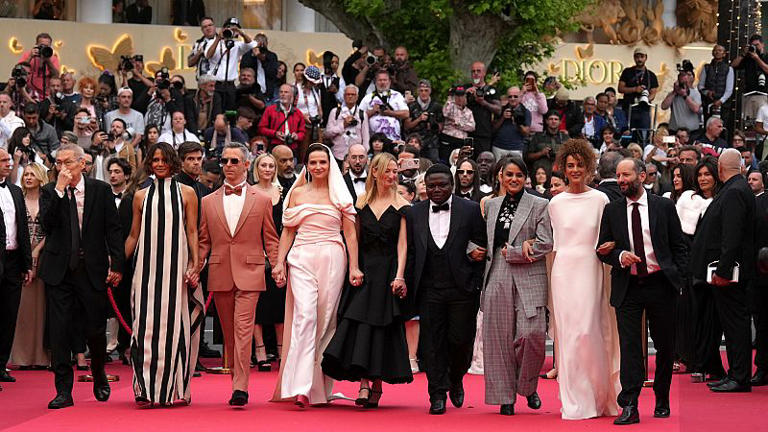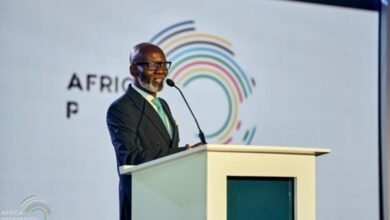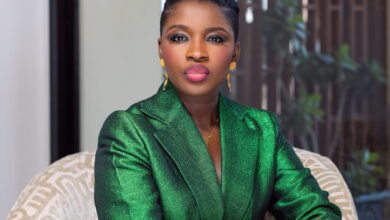Cannes 2025 : a barometer of an Africa taking its place on the global cinematic stage
With three African films in the Un Certain Regard selection and two in the official competition, the 2025 edition of the Cannes Film Festival marks a historic turning point for the continent’s cinema. Powerful stories, off-centered perspectives, assertive voices, and a rise supported by structuring initiatives like the African Film Fund launched by Afreximbank: Cannes becomes, this year, the mirror of an African cinema in full affirmation.

By Bylkiss Mentari
Until now little represented in the official selections, Africa is making an unprecedented breakthrough. My Father’s Shadow, directed by Nigerian Akinola Davies Jr., is the first Nigerian feature film ever selected in Cannes’ official competition. Shot in 16mm on the bustling streets of Lagos, the film revisits Nigeria’s political traumas through the eyes of two children confronted with the annulment of the 1993 presidential election. Between intimate memory and political fresco, the work marks a milestone for Nollywood, long confined to productions intended for the local market. “Filming Lagos is filming a collective memory we thought was erased,” says the director.
Another highlight of the festival: the consecration of Lubunyu, by South African Murena Emmanuel Netshitangani, originally from Limpopo, which wins the Best African Film Award at the 2025 Cannes World Film Festival. A contemplative work anchored in Venda culture, Lubunyu offers demanding, poetic, and rooted auteur cinema. A showcase that proves South Africa is not limited to urban or post-apartheid stories, but also explores invisible identities within the continent itself.
A plural, committed… decolonized cinema

Cannes 2025 is also the showcase of a plural African cinema that deconstructs expected narratives. In Un Certain Regard, three films — Promis le ciel by Franco-Tunisian Erige Sehiri, Aisha Can’t Fly Away by Egyptian Morad Mostafa, and Gods of Dust by Burkinabe Abdoulaye Konaté (out of competition) — offer a sensitive and deeply local perspective on African realities often absent from international screens.
Sehiri questions anti-Black racism in Tunisia by following the daily life of Sub-Saharan migrant women; Mostafa explores the marginality of a young Sudanese migrant in a working-class district of Cairo, in a language blending Arabic, Fula, and English. These films share a common desire to tell Africa from Africa, in its languages, its realities, its contradictions.
Toward a Pan-African audiovisual industry: Between ambitions and challenges

Beyond the Cannes spotlight, this emergence is the result of a continental strategy. The African Film Fund, announced by Afreximbank in May 2025 with a one-billion-dollar allocation, is a structural response to the sector’s historical obstacles: underfunding, lack of infrastructure, market fragmentation. Aiming to support production, distribution, and training, this fund, linked to the CANEX (Creative Africa Nexus) program, intends to transform the ecosystem sustainably.
In addition, platforms like FEDA (Fund for the Development of Audiovisual) — recently strengthened — are betting on talent training, the creation of post-production studios on the continent, and the digitization of content to better export it.
However, major challenges remain: lack of cinemas, weak protection against piracy, limited access to international distribution networks. And yet, the talent is there. This is evidenced by the dozens of African filmmakers present in Cannes’ parallel sections or professional markets such as the Marché du Film, where delegations from Nigeria, Tunisia, Rwanda, and Senegal stood out this year.
African audio on the rise: Between podcasts, series, and film music
The affirmation of African cinema is part of a broader boom in African audio production. Africa is experiencing an explosion of podcasts and audio storytelling, especially in metropolises like Dakar, Abidjan, Nairobi, or Johannesburg. Young creators are seizing sound as a tool for free storytelling, often more accessible than image. Platforms like SemaBox (Kenya), Africa Podcast Network, or SoundConnect are fostering the emergence of audio narratives carried by African voices, often female, diasporic, and decolonial.
At the same time, African film soundtracks are beginning to draw the attention of major labels and music streaming platforms. Composers like Ré Olunuga (Nigeria), Mohamed Abozekry (Egypt), or Amine Bouhafa (Tunisia) are gaining recognition with sonic signatures blending traditional instruments and electronic layers, creating unique and rooted atmospheres.
Africa is writing its own script
Cannes 2025 has been the reflection of a continent writing, listening to, and telling its own stories at human height. African narratives are no longer peripheral — they are central. No longer objects of exoticism, but subjects of history.
This momentum must now be sustained over time. Provided that training, south-south co-productions, screen access, content exportation, and preservation of African audiovisual heritage are strengthened. Because recognition is here. What remains is to turn it into a lever for lasting transformation.






